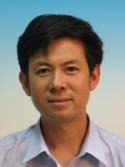
Biography:
Dr. Wu Guosheng, was born in September 5, 1964 at Hubei Province. He graduated from the Department of Geophysics with Bachelor of Science, Peking University in 1983, and graduated from the Department of Philosophy, Peking University with a Master of Philosophy in 1986. After graduation, He entered the Institute of Philosophy, Chinese Academy of Social Sciences to be a research fellow at the Department of Philosophy of Science and Technology. In 1998, He got Doctor's Degree of Western Philosophy from the Department of Philosophy, Chinese Academy of Social Science. He is now the director of the Center for Social Study of Science, and the director of the Center for Scinece Communication, Peking University.
Since 1986, He has been focusing his work on three fields: The History of Scientific thought, Phenomenology of Mathematics and Natural Science, Philosophy of Technology and Green Thoughts. He did some topical research on a series of concepts of Nature, Universe, Time, Space, etc.
Main Publications are as follows:
1. The Fallacy of Ontology of Nature, 1993
2. Greek Spatial Concepts, 1994
3. A History of Science, 1995
4. The Idea of Time, 1996
5. Recall Nature, 1998
6. Worried Thinking about Modernization, 1999
7. Let Science back Humanities, 2003
8. Reflecting Science, 2004
Abstract:
Department of Philosophy in Peking University, China
Yan Fu's translation of Huxley's Evolution and Ethics initiated a transformation of the historical view in the late Qing Dynasty. Social Darwinism was introduced into Chinese society in a widespread and thorough way. This article will evaluate the changes in the view of time and history throughout this period as one of the most important results of the introduction of social Darwinism into China. Traditional view of Time and History was substituted. A series of new concepts such as evolution, progress, natural selection, historical trend were widely known in a different social level. From 1898, Social Darwinism was the dominant Western "ism" influencing Chinese politics and thought and influenced reformers and revolutionaries and even paved the way for Chinese Marxism and the thought of Mao Zhedong.